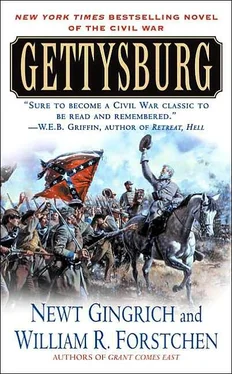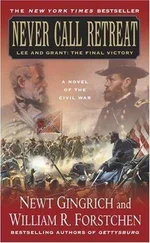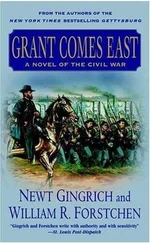Newt Gingrich - Grant Comes East
Здесь есть возможность читать онлайн «Newt Gingrich - Grant Comes East» весь текст электронной книги совершенно бесплатно (целиком полную версию без сокращений). В некоторых случаях можно слушать аудио, скачать через торрент в формате fb2 и присутствует краткое содержание. Жанр: Исторические приключения, на английском языке. Описание произведения, (предисловие) а так же отзывы посетителей доступны на портале библиотеки ЛибКат.
- Название:Grant Comes East
- Автор:
- Жанр:
- Год:неизвестен
- ISBN:нет данных
- Рейтинг книги:3 / 5. Голосов: 1
-
Избранное:Добавить в избранное
- Отзывы:
-
Ваша оценка:
- 60
- 1
- 2
- 3
- 4
- 5
Grant Comes East: краткое содержание, описание и аннотация
Предлагаем к чтению аннотацию, описание, краткое содержание или предисловие (зависит от того, что написал сам автор книги «Grant Comes East»). Если вы не нашли необходимую информацию о книге — напишите в комментариях, мы постараемся отыскать её.
Grant Comes East — читать онлайн бесплатно полную книгу (весь текст) целиком
Ниже представлен текст книги, разбитый по страницам. Система сохранения места последней прочитанной страницы, позволяет с удобством читать онлайн бесплатно книгу «Grant Comes East», без необходимости каждый раз заново искать на чём Вы остановились. Поставьте закладку, и сможете в любой момент перейти на страницу, на которой закончили чтение.
Интервал:
Закладка:
A rifle ball hummed dangerously close and then another. One of his escorts cursed and clutched his arm.
"They might have some sharpshooters over there armed with Whitworth rifles," Hotchkiss said. "Sir, I think we should pull back to safety."
Lee reluctantly agreed, and turning Traveler he regained the road and cantered back into the mists. A parting shot from one of the thirty-pounders shrieked overhead.
Near the stream where troopers still labored to build a bridge over the swollen creek, he stopped, Jeb pointing the way to a tarpaulin spread taut in a stand of chestnut trees, a table and chairs beneath.
Dismounting, the group gathered around the table. Hotchkiss reached into his oversized haversack and pulled out a map on rough sketch paper, folding it out on the table.
"I drew this up last night," Hotchkiss said, "after talking to some of Stuart's men and interviewing some locals who claim to be on our side.
"This is Fort Stevens, which you just saw," he said as he traced out the necklace of fortifications that were like beads on a chain embracing the city.
"Are there any weak points at all?" Lee asked.
Even as he spoke and looked at the map, the moment struck him as strange, tragic. This was once his home. He remembered a Washington without fortifications, lush meadows and fields surrounding the city, blistering in the summer but delightful in autumn and early spring.
Hotchkiss shook his head.
"They've covered every approach. Trees and brush cut back in places for nearly two miles to give clear fields of fire and deny concealment. The Virginia side is even worse."
Lee said nothing. He knew Arlington had been turned into a fortified camp. The approach to Alexandria, where the main military railroad yard was located, was an impossible position to storm.
"It has to be here," Lee said softly. "We must stay in Maryland; to cross back over the river and attempt it from the Virginia side is impossible, if for no other reason than the Potomac cannot be forded."
"It will be the same here or over toward Blandensburg or down along the river. The fortifications will be the same."
He looked over at Hood, who was silent, staring at the map.
"General Hood, do you think you can take that fort?" Hood looked up at him. "When, sir?" "By tomorrow."
There was a moment of silence.
"Sir, I'm strung out along twenty miles of road, my men are exhausted. Pettigrew is in the lead, I could have him up by late in the day, but it won't be until midday tomorrow that I can have all my divisions ready. If it should rain again today, sir, I can't even promise that. You saw the roads."
Lee had sympathy for Hood on this. He had indeed seen the roads, the thorough job that the Union forces had done destroying bridges and mill dams from here halfway back to Westminster.
He thought back to just before Gettysburg, the sense of hesitation in his army in spite of their high spirits, the sense that he was not fully in control. Was that setting in again now that the euphoria of victory was wearing thin because of exhaustion and the unrelenting rains? Am I pushing too hard now, should I wait?
He stood gazing at the map of the fortifications.
This is the only chance we will ever have, he realized. We must take it now. I must push the army yet again.
"It has to be here," Lee said. 'To try and maneuver now would be fruitless. They have the interior lines and maintained roads; wherever we shift, they will be in front of us. That and every hour of delay will play to their advantage."
He looked over at Stuart, who nodded.
"We've had half a dozen civilians get through the lines during the night," Stuart announced. "Reinforcements are starting to arrive in Washington from as far away as Charleston. Their newspapers are reporting that as well. The garrison is most likely at twenty-five thousand now; before the week is out, it could be forty thousand or more."
"Then we have to do it now," Lee replied, "Every hour of delay only strengthens them."
"I can't hope to have any artillery support for at least two days," Hood said, his voice pitched low. "They're stuck in the mud from here clear back to Westminster."
"General Hood, the artillery we have will do little if anything against those fortifications."
"So we are to go in without artillery support, sir?"
"Yes, General, without artillery."
"Sir. Respectfully, sir, you know I'm not one to shy away from a fight," and he fell silent, head half-lowered.
Lee looked at him. I need dissent, I need to listen. It was listening to Longstreet, the first night at Gettysburg, that had set victory in motion.
"Go on, General Hood, please speak freely, sir."
"Thank you, General. Sir, I have a bad feeling about this one.
Hood looked over to Stuart as if seeking support. Lee followed his gaze and could see Stuart lower his eyes. He was troubled as well.
"Why this bad feeling, General Hood?" Lee asked, his voice pitched softly, almost deferential.
"Sir, we won the most glorious victory of the war little more than two weeks ago, but it came at a terrible price. Pettigrew, who will lead off the assault here, took nearly fifty percent casualties. My other divisions, on average, still are down by twenty percent or more."
"Reinforcements are promised," Lee offered and instantly regretted the statement. It sounded like an attempt at justification. Hood was talking about tomorrow, not what Davis had promised and what most likely would not arrive for weeks.
"Go on, General," Lee said.
"Though well fed these last six weeks, the men are exhausted; many are ill from the weather and the heat. If I go in tomorrow, sir, at best I can muster twenty thousand rifles."
"I am aware of that, sir. The question is, with those twenty thousand, can you take those works?" He pointed back toward the city.
Hood looked around at those gathered, the staff standing deferentially in the background. No general ever wanted to admit that he could not do the task assigned. He took a deep breath.
"I can take the works, sir."
"Good. I will leave the details to you, General. Fort Stevens will be the center of the attack; I need this road to move up our following units. General Longstreet's men will push into the city once you have cleared the way."
The look in Hood's eyes made him pause. Yet again it was rivalry, the sensitivity of who would claim what. He offered a smile.
"General, when we take the White House, you will be at my side."
"It's not that, sir." "What then?"
"Sir, I will have no command left to march into Washington." "Sir?"
"Just that, General Lee. I have twenty thousand infantry fit for duty in my divisions. I will lose half of them taking that fort and clearing the way for General Longstreet. The men will be charging straight into thirty-pounders loaded with canister; they throw nearly the same weight as all the guns we faced atop Cemetery Hill two weeks ago. There are some hundred-pounders on that line; a single load of canister from one of those guns can drop half a regiment."
Lee lowered his head, the memory of that debacle still haunting him.
"General Longstreet, sir, has barely twenty thousand under arms as well and, sir, once the outer ring cracks, we might have to fight Washington street by street, clear down to the Naval Yard. I must ask, sir, after that, then what?"
All were silent. Lee looked from one to the other and knew that General Hood had asked the most fundamental question of all. The answer had seemed easy enough two weeks ago; the objective was to destroy the Army of the Potomac, to take it off the field. They had achieved that… but still the war continued.
If we take Washington, then what? For over a year he had fought under the assumption that if indeed Washington fell, the war was over, but now he wondered. The thought of capturing Lincoln, of having Lincoln and Davis then meet, like Napoleon and the czar at Tilsit, to talk and to sign a peace, was that realistic? He rubbed his eyes, picked up a tin cup of coffee someone had set by his side, and sipped from it, gazing at the map, but his mind was elsewhere.
Читать дальшеИнтервал:
Закладка:
Похожие книги на «Grant Comes East»
Представляем Вашему вниманию похожие книги на «Grant Comes East» списком для выбора. Мы отобрали схожую по названию и смыслу литературу в надежде предоставить читателям больше вариантов отыскать новые, интересные, ещё непрочитанные произведения.
Обсуждение, отзывы о книге «Grant Comes East» и просто собственные мнения читателей. Оставьте ваши комментарии, напишите, что Вы думаете о произведении, его смысле или главных героях. Укажите что конкретно понравилось, а что нет, и почему Вы так считаете.












